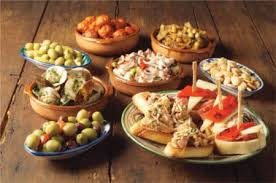Tapas, a selection of small dishes or snacks, is a traditional part of Spanish cuisine. Sometimes served as appetisers with drinks before a later meal, a selection of tapas can also be the whole meal. Tapas dishes have become popular across the world in restaurants, at dinner parties, and even as an option for office lunches. The origins of tapas are obscure, with many tales about how this style of food started and many places in Spain claiming to be the founder.

A drink protector
The word ‘tapas’ comes from ‘taper’, which means ‘to cover’. One suggestion for the origin of tapas is the humble inn. It is suggested that the first tapas dish was a piece of bread served with cold meat and cheese, which the innkeeper would put over a drink to keep flies and dust out.
A royal origin
Another theory is that the tradition was started by King Alfonso X (1221-1284). While recovering from an illness, the king was prescribed large quantities of alcohol and would eat small portions of food to mitigate the effects. Once he recovered, he ordered everyone to serve small dishes with drinks to prevent drunkenness.
Enjoying tapas
Whatever the origin, hot and cold tapas dishes can be easily prepared for meals at home, picnics, or office lunches. They can also be found in many restaurants, prepared by catering companies, or found on the menus of office lunch providers such as www.crumbsdelivered.co.uk/index.php/product-category/lunch.
Tapas dishes
Hot tapas dishes can include tortilla, which is similar to an omelette; patatas bravas, which is a baked potato dish served with a sauce; ham croquettes; and smoky albondigas, which are a Spanish meatball. If you want to try making some delicious tapas dishes, Olive Magazine has a good selection of easy recipes.
Cold tapas dishes include olives, salads, Serrano ham with melon, bread, cold meat, and cheeses.

Tapas is a highly versatile cuisine, so there is sure to be something for everyone no matter what their taste or diet. The spread can be simple or elaborate, making it suitable for all occasions.



